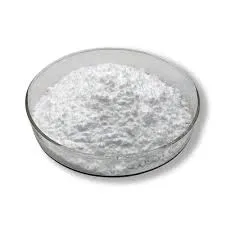
Οκτ . 11, 2024 15:09 Back to list
Applications and Benefits of Hydroxyethyl Cellulose in Various Industries
What is Hydroxyethyl Cellulose Used For?
Hydroxyethyl cellulose (HEC) is a non-ionic, water-soluble polymer derived from cellulose, a natural polymer found in the cell walls of plants. With its unique properties, hydroxyethyl cellulose has become an essential ingredient in various industries, ranging from cosmetics to pharmaceuticals. Its versatility is attributed to its ability to modify the viscosity of liquids and its capacity to stabilize emulsions.
What is Hydroxyethyl Cellulose Used For?
In addition to its role in cosmetics, hydroxyethyl cellulose is widely utilized in the pharmaceutical industry. It serves as an excipient in drug formulations, helping to control the release of active ingredients. By incorporating HEC into tablets or capsules, manufacturers can modulate the release rate of medications, allowing for extended-release formulations that improve patient compliance by reducing the frequency of dosing. Furthermore, HEC is often used in ophthalmic solutions as a viscosity-increasing agent, which enhances the comfort and efficacy of eye drops by prolonging their action on the ocular surface.
what is hydroxyethyl cellulose used for

The construction industry also benefits significantly from hydroxyethyl cellulose. It is commonly added to cement-based mortars, plasters, and tiles to improve their workability and adhesion properties. HEC enhances the fluidity of the mixture, making it easier to apply while preventing segregation of the components. Additionally, it aids in water retention, allowing for extended working times and reducing the risk of cracking during the drying process. This feature is particularly useful in hot weather conditions where rapid drying can lead to compromised structural integrity.
Another notable application of hydroxyethyl cellulose is in the food industry, where it is utilized as a thickener, stabilizer, and emulsifier. It helps improve the texture and mouthfeel of various food products, such as sauces, dressings, and ice creams, allowing for an appealing consistency. HEC also plays a significant role in gluten-free formulations, providing the necessary binding and texture that can be challenging to achieve without gluten.
In summary, hydroxyethyl cellulose is a versatile and valuable polymer used in a wide range of applications across different industries. Its ability to thicken, stabilize, and control the release of substances makes it an indispensable ingredient in cosmetics, pharmaceuticals, construction materials, and food products. As innovation continues in these fields, the demand for hydroxyethyl cellulose is likely to grow, underscoring its significance in enhancing product performance and consumer satisfaction. Whether it’s in your favorite moisturizer or the medications you rely on, HEC plays a crucial role in the functionality and efficacy of many everyday products.
-
Unlocking the Benefits of HPMC Products: A Gateway to Versatile Applications
NewsAug.07,2025
-
Unleashing the Potential of HPMC Ashland: A Comprehensive Look
NewsAug.07,2025
-
Tile Bonding Cellulose: The Key to Superior Adhesion and Durability
NewsAug.07,2025
-
Hydroxypropyl Methylcellulose Powder: The Versatile Component in Modern Pharmaceuticals
NewsAug.07,2025
-
Hydroxyethyl Cellulose: The Versatile Solution for Various Industries
NewsAug.07,2025
-
Hydroxyethyl Cellulose (HEC): The Versatile Polymer for Various Applications
NewsAug.07,2025







